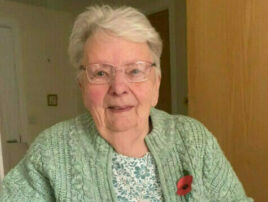
Tuesday 6th July 2021
Why I won’t recommend the film, ‘The Father’
Anthony Hopkins is a great actor and one of the few who can tempt me to the cinema. So when I heard he was playing a person with dementia I went to see it with a friend who works in a local care home. It was creatively compelling and hopelessly heart-breaking—everything the cultural tragedy narrative around dementia would have us believe is inevitable and true. Each person’s dementia is different and many drift gently, but that would not have given us the drama of the Father.
Hopkins’ performance and the film itself were both a tour de force. We felt his confusion, fear, frustration and grief, especially in a lingering close-up on his eyes. We thought too, that his dementia was made worse by the lack of empathy and understanding of most of the people in his life, which often disturbed and frightened him. For example, he was challenged with direct questions that he couldn’t answer 71 times, and asked, ‘don’t you remember’ 11 times. He was contracted 17 times, and given logical explanations that made no sense to him 20 times. It’s like expecting someone with a broken leg to walk briskly up and down the stairs. It was as though the books and training over the past twenty years that have changed the way we understand and care for people with dementia have never been published.
The first book to describe an effective and compassionate approach to care was published in 2008, by clinical psychologist Oliver James. Called ‘Contented Dementia’, it was based on the experience of his mother-in-law, Penny Garner, now a professional carer, who had cared for her mother while she lived with dementia. It gives cases studies of people living fairly contentedly with dementia, thanks to a kinder, better informed way of caring - a far cry from that shown in the film. The book has sold over 70,000 copies and has inspired similar approaches, some more prescriptively themed.
The essence of good care is more than just knowing the person, it is relating to them empathically in big and little ways. Former care home manager Janet Jacob tells of a resident who, almost every day, emptied her wardrobe and drawers and piled all her clothes on her bed. Janet knew that the resident had been the wife of a diplomat and had travelled frequently in their lives together, so gave her a couple of suitcases. The resident happily put her clothes in the suitcases and the next day put them back in the drawers and wardrobe. There are psychological and spiritual applications too.
In his book, ‘And still the music plays’ Dr Graham Stokes, medical director of BUPA homes unravels the mystery of a resident’s puzzling behaviour, who screamed non-stop when placed in her wheelchair near the window looking out onto the home’s pleasant garden. Carers had no idea that she had a phobia about cats, and that the statuette of a cat on the windowsill was responsible for her terror. Scripture reading and worship often bring a response from the soul of a person in the deepest dementia.
An opportunity to reassure the Father is missed when he insists his watch has been stolen. His daughter reminds him that he has forgotten where he puts it and unsettles him by fetching it for him. Had she empathised with his feeling of loss and suggested that they search for it together he could have found it and felt less threatened by the blank in his mind. The antiquated thinking showed when care homes were referred to as ‘institutions’, which was exactly how the care home he was eventually placed in seemed to be. As a drama it succeeded, but not in portraying how we live with dementia today.





































